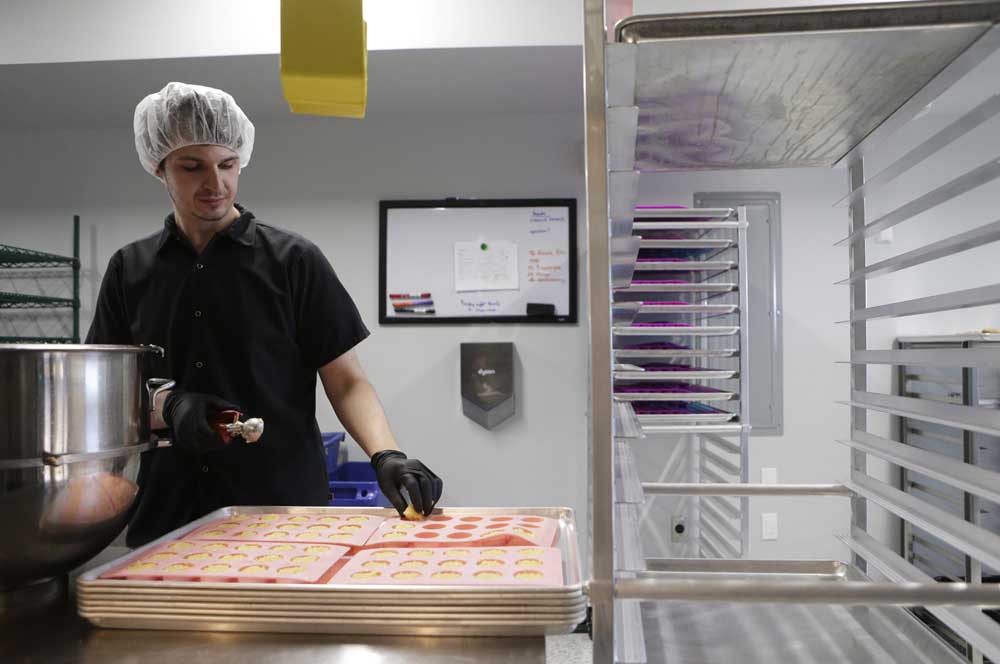Edible cannabis maker expands to California
Published 12:00 am Tuesday, June 19, 2018

- Darian Bighaus fills trays with macaroon batter to bake at Lunchbox Alchemy on Friday. (Joe Kline/Bulletin photo)
Nothing on the outside of Lunchbox Alchemy’s plain, red and gray building in Bend hints at the thrum of enthusiasm inside where workers talk about new flavors, new products and new markets.
In the Layton Avenue building 40 employees come together daily to make edible cannabis-infused products that they call squibs, shrapnel and macaroons.
Trending
These gummy candies, hard candies and cookies are the same products that Lunchbox plans to start manufacturing next month when it opens an 11,000-square-foot manufacturing facility in Santa Rosa, California, said Burl Bryson, Lunchbox Alchemy chief executive officer.
The expansion to California, which started recreational cannabis sales in January, could position Lunchbox as a brand in a large, emerging market. Edibles could become a $700 million to $800 million industry in California, the fifth-largest economy in the world, said Greg Shoenfeld, vice president of operations at BDS Analytics in Colorado, a cannabis market research firm. In the first four months of legalized recreational use, edible cannabis products racked up $107 million in sales, Shoenfeld said.
“It’s the third-largest category,” Shoenfeld said. “Traditionally vape products are the products with the biggest growth in the market. Over time you’ll see edibles overtake vape products. We find the pricing of edibles to be very stable because of the branding.”
Edibles have already taken a bite out of the recreational cannabis market in Oregon with more than $5 million in sales in May, compared to about $4 million in sales in May 2017, according to data provided by the Oregon Liquor Control Commission, which oversees recreational cannabis.
Edibles have garnered about 15 percent of the recreational adult market in Oregon and about 14 percent in California, Shoenfeld said.
At Jeremy Kwit’s three retail outlets in Bend, edibles make up about a quarter of his sales.
Trending
“Edibles are wonderful for consumers because they’re easy to dose and titrate,” Kwit said. “They’re discrete and delicious. I don’t feel there’s anything wrong with a little bit of indulgence.”
Kwit believes that consumers have come to trust edibles because of rigorous testing for THC, tetrahydrocannabinol, the psychoactive ingredient in marijuana, that the products undergo. In Oregon, a single serving can have no more than 5 milligrams of THC. But some consumers do find them a bit expensive, with the lower end of the products at $10 per serving.
Federal laws prohibit the transfer of cannabis and cannabis products across state lines. Because of that, Lunchbox Alchemy’s Santa Rosa facility will have to be an entirely separate business.
Some companies may opt for licensing agreements in other states for their branded products, Shoenfeld said.
Bryson said California is a great market for growth of Lunchbox Alchemy’s branded products because it has a potential to be 10 times the size of the Oregon market.
Washington state does not allow for the sales of edible gummy products.
Lunchbox, which processes its own concentrates and oils derived from cannabis grown on 20 to 30 different Oregon farms, made $3 million in sales last year and is in 350 retail locations in Oregon. The company expects sales to double this year, despite having its manufacturing operations offline for the first six months of the year while the firm was completing its new Bend facility.
“It’s important to control the oil and manner of extraction for our edibles,” Bryson said. “We control the nutrients in our products. We think of our product as medicine.”
When it gets the green light in Santa Rosa, California, Lunchbox plans to begin production using cannabis grown in the state. The company already has 75 retail outlets throughout the state that will sell its products. For Lunchbox it’s all about brand integrity, said Cameron Yee, owner of the company.
“We are always looking for collaborative companies that help us tell our story,” Yee said. “Our brand is all about the ethical practice.”
In California, Lunchbox plans to offer the same product consistency that customers have come to know in Oregon, Bryson said.
“We’re not able to produce new products until we get our license,” Bryson said. “We’re still waiting. We plan to take what we’ve done here in Oregon: brand development, quality, and consistency. We come from that true belief and value of the medicine. We are notoriously consistent with people and edibles.”
Twenty-nine states or territories, including the District of Columbia, Guam and Puerto Rico, allow marijuana use for medical purposes. Nine states — Alaska, California, Colorado, Maine, Massachusetts, Nevada, Oregon, Vermont and Washington — allow for recreational use.
“Our goal is to have Lunchbox go global,” Bryson said. “The industry is growing so fast that if we do it right in California and drive the revenues right, we’ll be ready for other markets.”
— Reporter: 541-633-2117, sroig@bendbulletin.com








